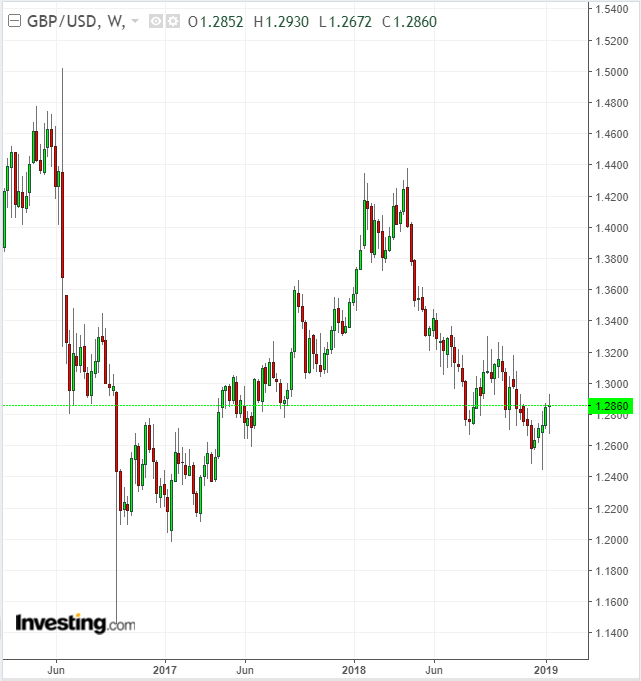by Pauline Thomas
What Just Happened?
It was widely expected that the UK parliament would vote down Prime Minister Theresa May’s Brexit withdrawal deal, however the majority of 230 votes marks an historic loss for a prime minister.
Directly after the vote, opposition leader Jeremy Corbyn announced a no confidence vote in the government. A successful no confidence motion would lead to a snap general election, causing the pound to fall as a result of market uncertainty.
The no confidence vote will be tabled in parliament later today however it is not expected to pass as it appears to not have enough support. A second no confidence vote cannot be held against the Prime Minister by her own party following December's unsuccessful no confidence vote.
Following this defeat, here are the options available to the UK with only 72 days left before the Brexit deadline on March 29.
Plan B
Theresa May has until Monday January 21 to return to parliament with a ‘Plan B’ version of her Brexit deal. Given that it took 18 months for her team to negotiate the deal in its current form, it is unlikely that she will be able to cobble together agreement for an entirely different deal in the coming days. Particularly one that will appease the 200+ that voted against Plan A on Tuesday.
In its current form, Plan B is not likely to pass. We do not expect that it is wholly different from the rejected deal and believe the EU will not budge on its position.
Plan B-2
One option could be cross-party support to table amendments to the current deal. In her speech following the vote, May calmed (some) market fears by stating it was not her intention to ‘run down the clock’ to the exit date. She would, in fact, seek cross-party support to work together on securing a deal to bring to the EU.
We'll see in the coming days whether parliament looks likely to find a workable solution and achieve an orderly Brexit ahead of the official exit date.

This situation would be positive for UK markets and should see the pound move higher. However, with a margin of 230 votes in direct opposition to May’s current deal, this looks difficult as parliament will have to overhaul the deal entirely.
No Deal Brexit
A vote in the House of Commons last week to give parliament more powers over government finances in the case of a no deal Brexit showed that the majority of MPs wish to avoid the no deal option.
Both the EU and UK view a ‘no deal’ as the worst-case scenario, something to be avoided at all costs. Still, as the clock ticks and we get closer to the exit date without a clear solution to the Brexit question, the reality is that the UK could crash out of the bloc without a deal.
According to ING analysts, cable will hit $1.12 and EUR/GBP will be near parity in a no deal scenario.
Delayed Brexit: Extension of Article 50
Delaying Brexit is not a given. EU leaders will have to unanimously agree to allow Article 50 to be deferred. The EU has been clear that Brexit will not be delayed ‘simply because the UK does not agree.’ Some scenarios which may see the EU grant an extension are the renegotiation of a new deal; a general election;or a second referendum.
In a note, investment bank Citi said on Tuesday, shortly after the result of the vote was released, that there was now a ‘very high’ chance that Brexit will be delayed past the official exit date. Economists at Citi said:
"The probability of Article 50 extension is now very high, and the stock of Article 50 revocation is rising too."
Renegotiation With EU
The EU has ruled out renegotiation of the current deal, but MPs could decide on a more market-friendly option, such as a Norway+ plan to take back to the negotiating table in Brussels.
Negotiation for a permanent customs union would also redraw the government’s red lines which would also solve the Irish border issue. However, it may not have the necessary support from parliament.
Redrafting the Withdrawal Agreement—or starting from scratch—will take a longer time to plan and put into law. As such, we would expect the government would have to ask the EU to delay Article 50. As these deals are on the side of a ‘soft’ Brexit, we expect the markets to view this as a positive development.
General Election
If the clock ticks down to the last moment and a no deal looks increasingly likely as no agreement can be reached among parliamentarians, we could see the Prime Minister call a snap general election in order to put the brakes on Brexit in the hope that the EU grants the delay for the country to go to the polls. We see a second referendum as more likely than this eventuality.
Second Referendum
A second referendum is viewed favorably by markets and the idea is gaining more momentum, with many of Theresa May’s party coming out in support of it. Parliament could table this motion in the coming weeks, however the time has run out to hold one before the deadline, meaning Brexit would need to be delayed.
